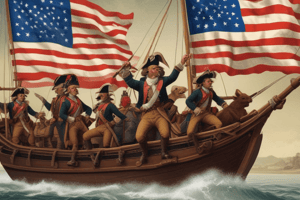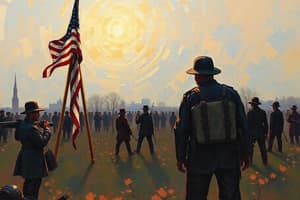Podcast
Questions and Answers
What was the main reason for the annexation of Alaska and Hawaii?
What was the main reason for the annexation of Alaska and Hawaii?
- To counter the British, French, and German colonization in Africa and Asia
- To strengthen the United States' strategic position and economic opportunities (correct)
- To expand American influence in the Pacific region
- To fulfill the destiny of the white man to rule the world
What role did Admiral Mahan play in influencing American expansion?
What role did Admiral Mahan play in influencing American expansion?
- Supported the idea of manifest destiny for American expansion
- Encouraged American planters to control sugar production in Hawaii
- Promoted the idea of countering European colonization in Africa and Asia
- Advocated for a larger navy with ports around the world to strengthen the US (correct)
How did the annexation of Alaska contribute to American interests?
How did the annexation of Alaska contribute to American interests?
- It countered British, French, and German colonization in Africa and Asia
- It opened new opportunities for American fishing, whaling, mining, and fur trapping
- It aimed to fulfill the destiny of the white man to rule the world
- It ended Russian involvement in North America and provided strategic advantages (correct)
What was a significant benefit of Hawaii's annexation for the US?
What was a significant benefit of Hawaii's annexation for the US?
What impact did British, French, and German colonization efforts have on American expansion?
What impact did British, French, and German colonization efforts have on American expansion?
What was one of the concerns that contributed to the nation's interest in acquiring Alaska and Hawaii as new territories?
What was one of the concerns that contributed to the nation's interest in acquiring Alaska and Hawaii as new territories?
What was a key factor contributing to America's desire for a larger navy with ports around the world?
What was a key factor contributing to America's desire for a larger navy with ports around the world?
How did Hawaii contribute economically to the United States after its annexation?
How did Hawaii contribute economically to the United States after its annexation?
What was one significant advantage of Alaska's annexation for America?
What was one significant advantage of Alaska's annexation for America?
What was one reason cited for annexing Alaska as part of "manifest destiny"?
What was one reason cited for annexing Alaska as part of "manifest destiny"?
Which foreign policy aimed to end US control of the Philippines and avoid US intervention in Mexico?
Which foreign policy aimed to end US control of the Philippines and avoid US intervention in Mexico?
Who established the Committee on Public Information to build support for the war and enacted laws like the Sedition Act and Espionage Act?
Who established the Committee on Public Information to build support for the war and enacted laws like the Sedition Act and Espionage Act?
Which event led to reduced freedoms and a divided public opinion in the US?
Which event led to reduced freedoms and a divided public opinion in the US?
Who focused on encouraging private American investment in other countries as part of their foreign policy?
Who focused on encouraging private American investment in other countries as part of their foreign policy?
Who extended the Monroe Doctrine, mediated in international conflicts, and sent the Great White Fleet to showcase US power?
Who extended the Monroe Doctrine, mediated in international conflicts, and sent the Great White Fleet to showcase US power?
Which president's foreign policy aimed to create peace in the world through his 14 points?
Which president's foreign policy aimed to create peace in the world through his 14 points?
Which US president intervened in Panama and was a rival of Woodrow Wilson?
Which US president intervened in Panama and was a rival of Woodrow Wilson?
What was the nickname for US soldiers who fought in World War I?
What was the nickname for US soldiers who fought in World War I?
Who was the US president during World War I?
Who was the US president during World War I?
What were the raids by US Government Agents to arrest and deport foreign radicals called?
What were the raids by US Government Agents to arrest and deport foreign radicals called?
'Red Summer' of 1919 was characterized by?
'Red Summer' of 1919 was characterized by?
What did Harding's 'normalcy' cover according to Harding's belief?
What did Harding's 'normalcy' cover according to Harding's belief?
What was the Teapot Dome scandal associated with?
What was the Teapot Dome scandal associated with?
What was the movement of African Americans from the south to the north looking for better job opportunities called?
What was the movement of African Americans from the south to the north looking for better job opportunities called?
What led to cultural changes such as the Harlem Renaissance in the 1920s?
What led to cultural changes such as the Harlem Renaissance in the 1920s?
Which amendment gave women the right to vote in 1920?
Which amendment gave women the right to vote in 1920?
Flashcards are hidden until you start studying
Study Notes
US Foreign Policy and World War I
- The US gained Puerto Rico, Guam, and influence over Cuba and the Philippines as a result of the war with Spain
- The war with Spain led to the death of many American troops and tensions with other nations and inhabitants of acquired territories
- Roosevelt extended the Monroe Doctrine, mediated in international conflicts, and sent the Great White Fleet to showcase US power
- Taft's foreign policy focused on encouraging private American investment in other countries
- Wilson's foreign policy aimed to end US control of the Philippines and avoid US intervention in Mexico
- Wilson established the Committee on Public Information to build support for the war and enacted laws like the Sedition Act and Espionage Act
- US participation in World War I led to reduced freedoms and a divided public opinion
- Wilson's 14 points helped structure the Treaty Of Versailles and aimed to create peace in the world
- The Treaty of Versailles was rejected by the Senate, leading to the US not joining Wilson's League of Nations
- The US became more engaged with the world during this era, expanding its navy, annexing territories, and participating in World War I
- Many Americans supported the expansion of US power, while others opposed imperialism or preferred isolationism
- The US transitioned from enthusiasm for foreign adventures to cynicism, but had become a world power
Studying That Suits You
Use AI to generate personalized quizzes and flashcards to suit your learning preferences.





